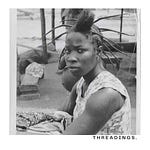Thus far, I have only written about Grief up close.
[insert a picture of Jordan Neely here, that I am too scared to find in a search engine for fear of seeing his execution.]
I have only written about up close and personal bereavement because I know him well when he puts on a body. That particular manifestation of Grief curls up in bed around me, an old-time lover that only wants to hold me. Easy Grief; daily Grief; a familiarity akin to a lifelong neighbor who lets himself into my house at any hour he so pleases to string together small bits of chaos, with love. He places the glass milk jugs I kept to house my flower arrangements back to be taken away. He boils water for tea too early. I slink downstairs at 10am in a sideways headscarf, robe untied, and find a mug of chamomile waiting for me: mostly cold, no lemon, far too much honey. A bit like a five year old son that insists on making me a mother’s day breakfast and destroys my kitchen in the process. A loving Grief; a magnified Grief; one I keep around because something has to fill the absence of the person gone, and because he’s easy company.
[Everyone always forgets Death is sweet and needs a partner to play cards with.]
I have not previously come to you all with words on the grief that hangs above us (we, the collective left here mourning). The big kind— the existential suit that does not know you well enough to have a key into your home and is far too grand to ease through your doorway anyhow. Collective Grief, a patchwork ceremony, swirls in the sight our mind all the time, all the time. This is the breath that collects over our heads and forms from the way we (a people bereaved) breathe out when faced with someone we lost and who we did not all get to know in the small and sweet chaos of everyday going ons. The condensation of a half-hearted cry. There is no room in this world and certainly no time in this world for us to weep properly and so we breathe out slow and make a cloudy sky— gray swinging low to kiss our foreheads with a cool and drugged breeze— enough to cloud our minds and numb us into tumbling forward— all the weight of impending rain— none of the release.
The reason I have not written about the weight of Collective Grief is because it requires me to sacrifice whatever I think might be helpful, and that is such an ego death. I am the type to crave dessert: sweet things after the hardship of bitterness. Soothing balms. Hot, hot tea. There is no instant relief from the growing pains of revolution so there certainly is no balm for the killings. There is no conflict resolution in murder. You cannot befriend the tragedy of white supremacy. I want to be kind and helpful— I want to turn myself into some soft and cozy respite. I dream I can be a relief since we (the people who Grieve) cannot seem to find the time and strength to finish the exhale and gather the pain. So the collective sigh that hang above us, half-bodied and half-baked, cools us into a quilted mind made content somehow with a sunless sky and morphine clouds and no rain to wash over us.
[I am always wishing to be the opposite of what I am. Death is sweet and I am alive and angry. My hands shake. I am almost too enraged to hold a pen.]
We can see the Collective Grief which settles for being almost rain; we completely ignore the Collective Grief that materializes in our hands. An acorn seed. Grief from the masses is also a seed that grows into an aspen tree: intentionally slow to root. Incredibly difficult to grow alone. Prone to rooting and dying, forcing whatever the gardener wishes this process was into a humble servitude. Incredibly. Difficult. To grow. Alone. I imagine fully realized Collective Grief and I see a grove of aspen trees— the ones that turn the mountains gold every September with the beauty of their hive dying. A people that commit to dying brightly together. Aspen groves are connected in their root networks, such that the whole forest breathes and turns as one, like a hand moving on divine inspiration to turn to the next page of a book. A grand and fingered body on its own. The thought that we, one day, could grow a grove with our Grief instead of clouds that cover us and do not speak makes me hold onto the seed I get each and every time someone who looks like me dies on the world’s stage and has their personhood debated instead of laid to loving rest. I keep trying to grow my sapling alone and she keeps dying. So I will wait.
I think two things in summary: Grief is both the exhale of the bereaved and the inhale that fuels the body. The collection of our cry and the inhale of how we mobilize all this loose, untethered pain through our bodies and into the ground. This is exactly what I say about Love— that Love is the both the feeling that compels you to action and the action itself. Love and Grief are synonymous— sisters in that they cannot stay circulating inside our chests with no where to go. They will steal your breaths. They will collapse your ribs. They will commander whatever fertile earth is inside your own chest if you do not get on your knees and give them a ground to rest and root in. Collective Grief unfolds: the mass swelling of each individual’s cry and the individual planting the seeds that spring forth from the dying. Individual and communal effect, release, and action. Grief can grow like a tree and falls on us like rain and maybe bring forth something connected to outlive us— but only if we give what it takes.
[I, angry and unsweet, would like to tell you what I wish to see. What I see when I close my eyes and pray for the freedom and time to Grieve.]
Instead of this cascading, drugging fog masquerading as a raincloud, I pray for a torrential downpour. I pray it lasts a good and long and fertile season. We (the people here, surviving) move about, covered in wet fog while surviving a drought. How? How and for how long? I pray that we release ourselves from partial-hearted cries for justice and mercy while we’re on our way to work. We should be honest: mercy does nothing for the already dead and justice only comforts the living. I pray we weep for what we lose outright and for a good and long while. I want the weight of the deaths of our most vulnerable drives us into our gardens and onto our knees to plant. I want enough water to root a sapling. I pray we (on this side of revolution) commit to a grove whose fully realized beauty we will never see. That we (a people that allow Grief into our homes and bodies) teach our children that Grief belongs to us; Grief is a friend; Grief grows like a tree if you let it and like a cancer if you do not. I pray our saplings find each other underground and keep each other in time. We rise and fall and die brightly or not at all, again and again and with a still sort of peace— what is time to a grove of trees? I pray a blessed tradition of call and response recognizes the urgency of our moments, such that when the great great great great great great Greats ask why we put on gold when our most beloved and most vulnerable pass away, we tell them through the trees of what it took to get here. The age old stories.
[Grief is both the rain that nurtures the seeds and the grove that rises up to greet the downpour. Grief is both the call and the response. We (the People) keep our word to the deceased and bury them among the trees that bloom golden for us in their dyings. We keep the seeds and so we keep the trees and we witness the spectacle of death— way back then, under the empire, the spectacle of Death is everywhere as a means of fear and subjugation and hopelessness. We turn away from whatever numbs us and engage the call and response. We move together to plant the seeds that spring forth from the dying. And now, one day, yesterday or today, however we keep time in the world that comes after this one, we Grieve. We draw in the breath it takes to call forth the rain. We kept the skies for you and while it torrents, we say our prayers. The mountains turn gold in death and so do we. So this is the call and response of Grief, which reminds us of our tasks as the living: hands and knees. Plant the Grief. Run from the numbness and call forth the rain. Do all this in the name of a day where a tree stands in the place a seed once made her way into gentle earth. Gold for the days of the dying and the shining value of their lives. Gold for the days we grow a grove that triumphs over death. We are in a season of death. Autumn comes today and the buds of spring for the seventh generation lay just under the horizon— that is to say: today is the grieving. Today is the grieving. One day, we plant our seeds and we will wear gold and we will lay our dead to rest.]
ismatu gwendolyn
This piece could be a rant of anger that goes on, and on. But all I really hope to say is that there is a ton of noise. There are people with money and power who want you to think about anything except the fact that we have all the resources we need to care for one another, and the fact that society is set up to make them rich rather than to take care of you, and Jordan Neely. And there are others, people who have bought into a system that gives them little but the illusion of power and elevates them over other people not by raising them up but by forcing others down. But we outnumber them, their position is weakening as skyrocketing inequality strips away some of those small rewards they were given, and we can start to build a better world here and now with or without them. We must.
—















27 | the call and response of Collective Grief; to Jordan Neely